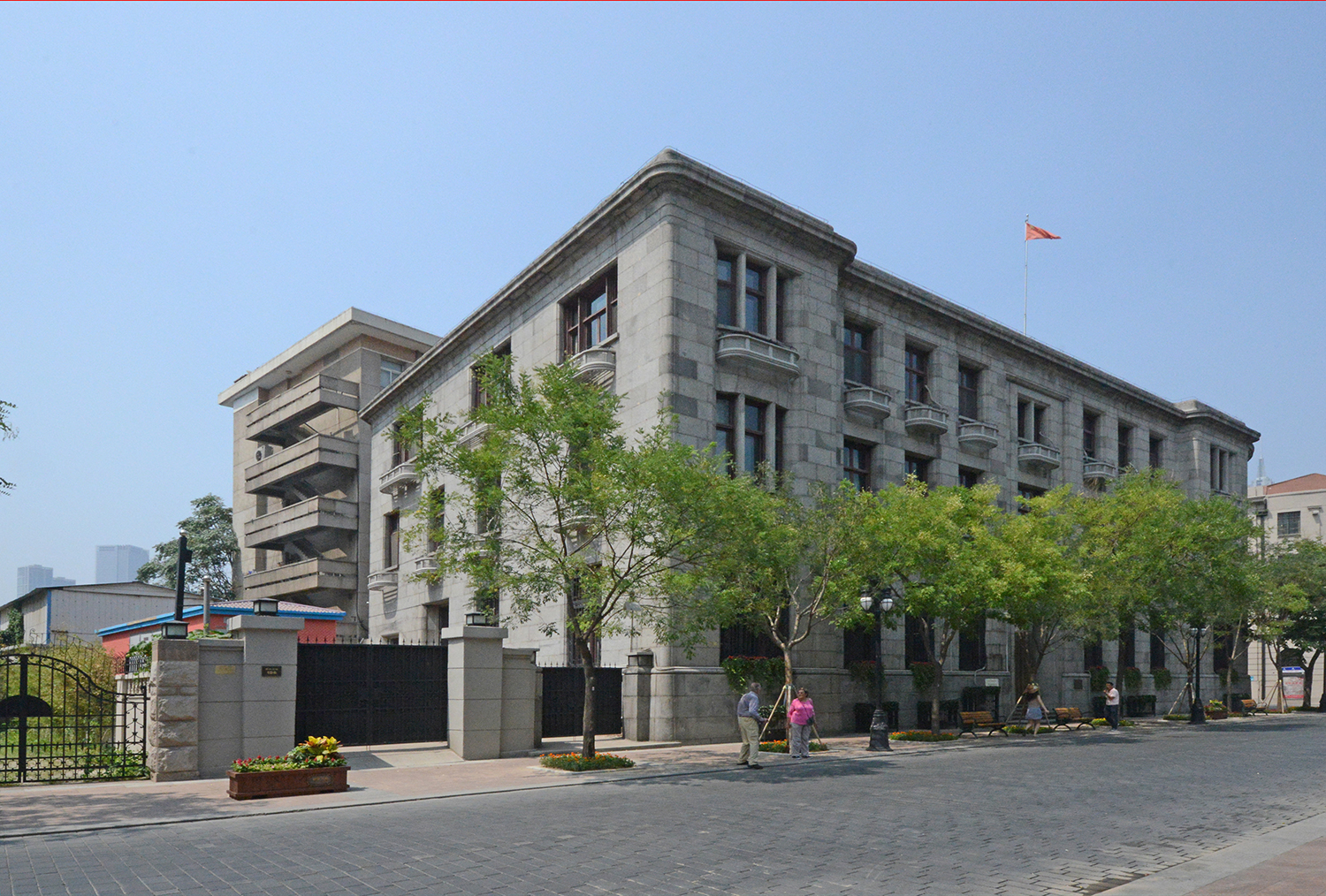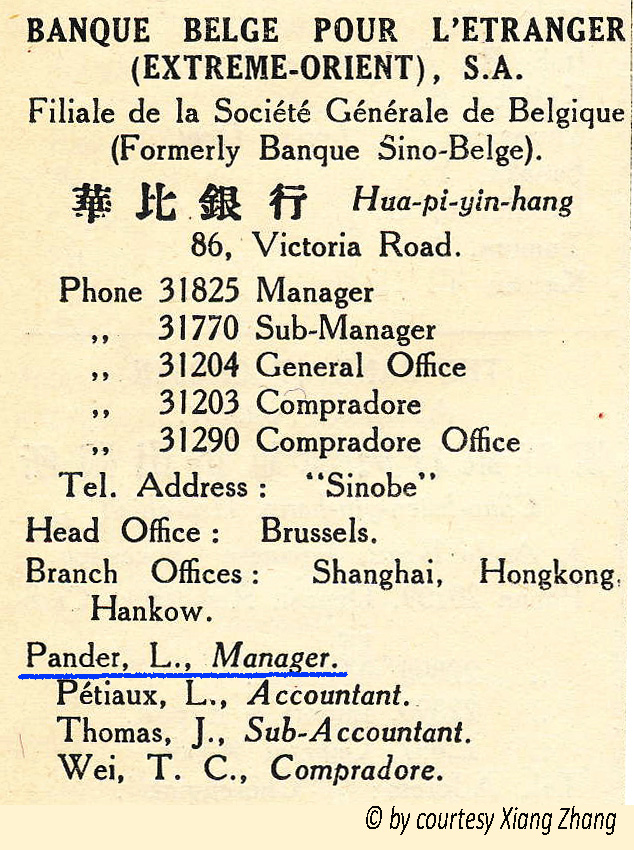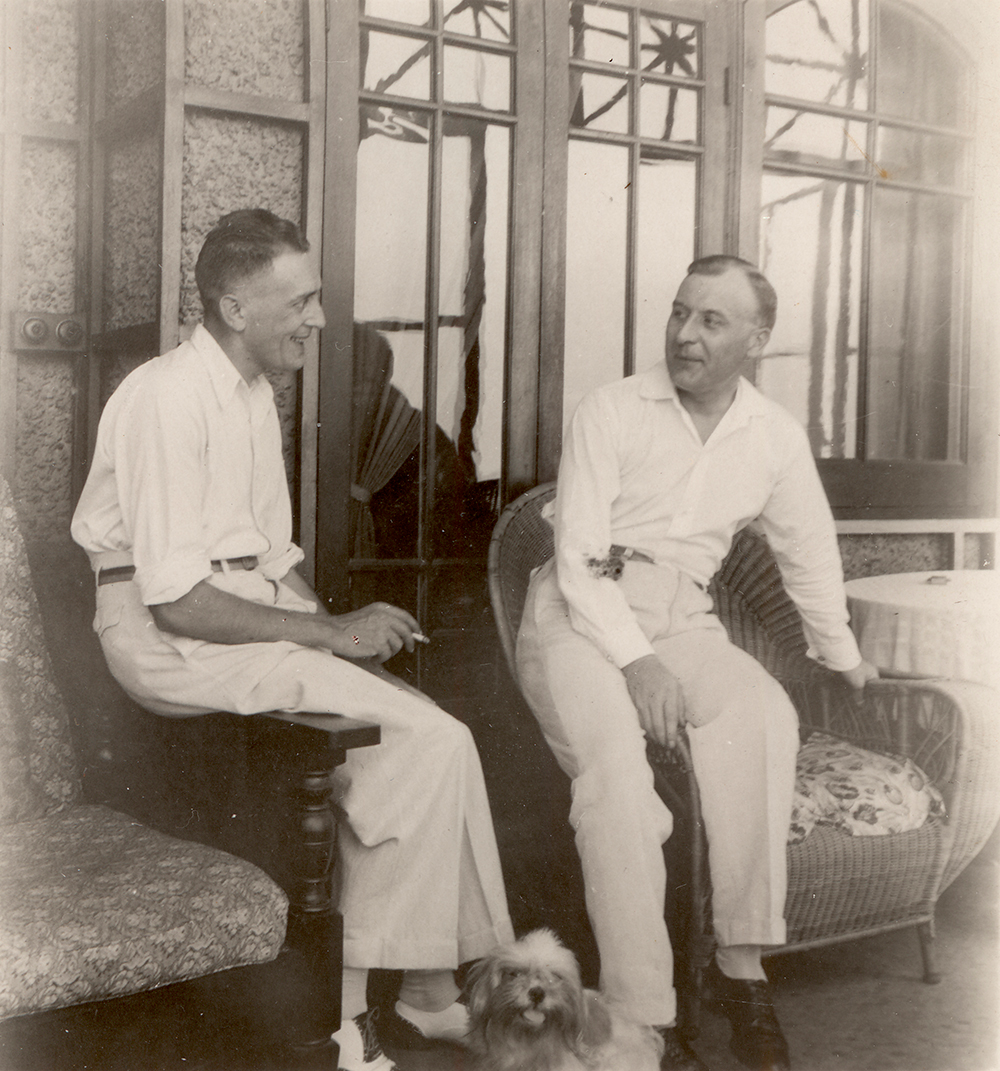
- by Léopold Pander Jr.
... an act of resistance ...

This building was - in 1941 - the Banque Belge pour l’Etranger - Extrême-Orient -
Photo: August 2015
© L. Pander.
... a true story,
… this is the story – as I remember it – the way our father (Mr. Pander, C.E.O. of the Belgian Bank in Tientsin) told us … many years after the war.
He came to China from Belgium after World War I ― in 1924 as a young banker and started his professional life in Peking.
At barely 30 years old, he was manager of a Bank in Hankow. He was very broad-minded to all the different cultures and customs of the time and became quite competent in the art of compromise and especially, discretion. I remember that when he was much older, retired … in Belgium, long after having left China, we asked him to write his memoirs. He refused to do so, pretexting that he knew too many secrets.
Let us come back to our story:
In 1941, Dad was the manager of the Belgian Bank in Tientsin and his assistant Manager was Mr. Pétiaux. Both of them were married with two very young children and the two families lived on the upper levels of the bank.
The bank itself was a three storeys massive building built in 1922 (Belgian architect: Mr. Gustave Volkaert). The ground floor and the basement were exclusively reserved to the bank. The first floor held the manager’s apartment and the second floor (under the roof) was for the Assistant Manager and their respective families. They lived where they worked.
... the facts:
Tientsin, December 8, 1941 – 7 o’clock in the morning …
… the two managers were brutally awakened by the coming of Japanese soldiers. The Japs were there to take over the Belgian Bank – they said -- “in the name of their emperor, Hirohito” …
 Quite rapidly, the attack on PEARL HARBOR became known to all, the Japanese being very proud of the success of their surprise action conceived by Admiral Yamamoto. They proudly divulged the news to impress the Chinese population as well as the foreigners.
Quite rapidly, the attack on PEARL HARBOR became known to all, the Japanese being very proud of the success of their surprise action conceived by Admiral Yamamoto. They proudly divulged the news to impress the Chinese population as well as the foreigners.
The Pacific War was beginning.
… and now, a little bit of history as to the overall situation in Tientsin as far as we were concerned:
Tientsin, December 1941.
On December 8, the Japanese military occupies all the key positions: administrations, banks, tramways, etc.; seize or insinuate themselves into all the affairs of the powers considered to be enemies of Japan: America - England - Holland - Belgium.
France - Germany - Switzerland - Sweden - Italy, keep their privileges as neutral countries or allies of Japan (Axis: Berlin - Rome - Tokyo).
The Belgian government of London had sided with the opponents of Japan, we become “the enemy” and subject to the Japanese military dictatorship with other countries.
France (with the presidency of Maréchal Pétain at its head) will benefit from doubt, during all the hostilities. The Japanese had already infiltrated the northern part of China since 1937. The regions of Peking and Tientsin were therefore administrated by the Japanese military power and thus, no resistance of any kind could be opposed against them at that time.
This was not the case in Shanghai and especially Hong Kong, where resistance occurred. The reprisals were bloody and terrible. To the military fury of the Japanese was added their racial hatred of the whites. The Hong Kong military forces resisted against the Japanese invasion by the way of arms and the Japanese fought back by killing without discrimination. Military as well as civilians – killing and raping.
These atrocities, if any, were very rare in the cities of Peking, Tientsin, and the regions of the North already under Japanese civil guardianship.
But prudence and obedience to regulations and defences were, of course, advised.
All “enemies” had to wear a red armband with the black sign indicating their nationality. Prohibition to leave the concession that one lived. Curfew. Obligation to submit to all kinds of vaccines. Passes needed. Requisition of cars, pianos, rugs, refrigerators.
Sentinels were posted at the entrances of all the important buildings, including the banks. All the enemy banks were therefore occupied by the Japanese and their “gold” seized in the name of the Emperor.
On the first day of occupation in the Belgian Bank, when the managers had gone downstairs, not yet fully dressed, the enemy had already invested the Bank, and Japanese soldiers with Arisaka Rifles and bayonets took over the whole building.
The administrators had to comply but adopted a style of hypocritical politeness in regard to their captors.
Rapidly and in the presence of the two managers, all the sensitive parts of the Bank were sealed such as the vault in the basement including the customers’ coffers. The Japanese requested all keys to be handed over to them, including all duplicates if any. My father, and the other members of the staff stated that no duplicates existed … so, none were given. They pretexted that it was a peculiarity of the Belgian Bank and the Japs believed it.
That same night, quite a while after closing time and in the silence of the night, the two managers and the comprador crept down into the basements and thanks to Mr. Wei’s skills, cautiously broke the Japanese seals placed earlier in the day and opened the vault with the spare keys they possessed.
A strong tarpaulin was spread on the vault’s pavement and the coffers of most of the important customers were unlocked and emptied of their gold ingots. The action went as fast as possible and in silence. The tarpaulin was then dragged out of the vault and the chamber was closed.
The seals retrieved their original state thanks to the comprador’s know how.
The tarpaulin was then painfully hauled to the upper floors and the contents hidden all over the place. My father told me that many ingots were hidden in the flush tanks of the toilets … amongst others!
Dad did not tell me if they were disturbed by Japanese guards so I guess that thanks to the managers’ rapid action – promptly after the Japanese takeover – the Japs’s organisation was not yet optimum or maybe that the guards, outside, were drowsing at their posts!
The story doesn’t finish here ...
This large amount of gold could not stay in the apartments at the Bank.
Discreetly the owners of the coffers were notified.
When told, they did not believe their ears. Their logical guess was that their possessions were lost and already in the hands of the Japanese emperor.
Slowly and surely, each client recovered his due.
Of course, considering the exceptional situation, no receipt could be required, a fact well understood by both parties.
Each of our Chinese clients gave his word of honour to confirm after the war that they had received the contents of their coffers.
Three years later, none failed.
This is a true story!
Later in the year, (1942) after this incident, we no longer lived at the Bank. The Japs transferred the two families to another location in Tientsin and we lived there, very uncomfortably, under house arrest.
Mr. Pétiaux was requisitioned by the Japs to work for the Tientsin Tramway Co. Dad had received the same kind of proposal but declined their offer and thus, his family was herded into a Concentration Camp for the duration of the war.
We lived in Weihsien for two and a half difficult years – 873 days.
Even after the war and a very long time after, Dad always refused to work or make business with or for the Japanese.
#


photo - 1938: (from left to right)
Mr. Leopold Pander Sr. and Mr. Pétiaux.
http://www.weihsien-paintings.org/pander/bbe/leopold.htm
#








